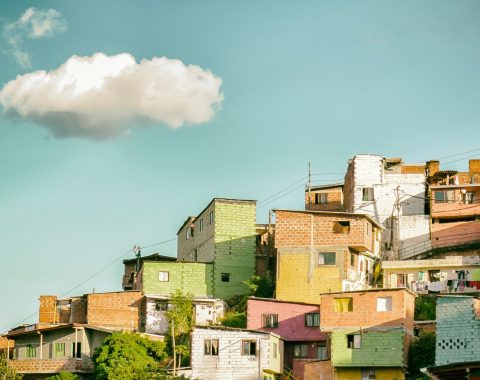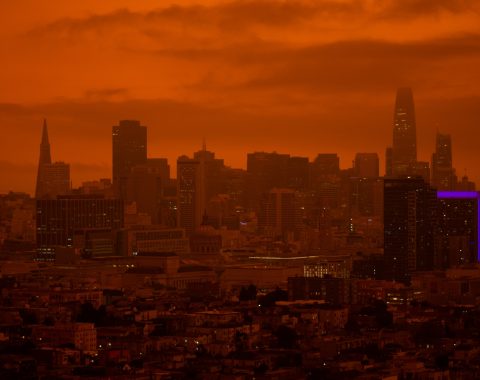If, from a place of ignorance, we quickly survey the dominant Colombian media, it’s easy and almost inevitable to conclude that Colombia is undergoing a Petrocalypse. Everything is going wrong; nothing can go right. The “pink” romantic progressive left, the politics of Love and Total Peace promoted by Gustavo Petro, has spectacularly failed in its promise to change a two-century-long conflict in Colombia within just its first two years. Somehow, everything is the president’s fault, which keeps the fanciest economists awake at night, inducing a terrible ailment called “investor uncertainty.” Anything is worse when it’s “Petro’s”: Petro’s metro, Petro’s reforms, Petro’s reelection, even Petro’s Ferragamo shoes. His corrupt and selfish allies are deemed worse than the countless corrupt officials of the past several decades of right-wing and far-right governments. Furthermore, he’s a terrible father, and his illegitimate child is cursed because Gustavo Petro was a sadistic terrorist when he was born and thus couldn’t raise him. Clearly, this man is the worst, and thus he deserves a mob of troglodytes harassing his youngest daughter in a soccer stadium.
However, it is inexplicable how this despicable figure appears on giant flags in North African football stadiums for his position on Palestine; meets with world leaders like Xi, Lula, or Biden to discuss decarbonization; and is welcomed and applauded by monarchies and international financial circles for his discourse on climate change. It must be that they are all part of the globalist Petro conspiracy. Surely, in addition to his profound evil, he has the gift of multiple personalities. To begin with, Petro is no longer the communist guerrilla Castro-Chavista that the media and the opposition claimed he was two years ago. Now, for the media companies and in the opinions of the microphone owners, he is a very dangerous mixture: a clear combination of populist, fool, corrupt, guerrilla, socialist, woke, globalist, cocaine addict, idiot, incompetent, lazy, disconnected, alcoholic, and ginandromorfofilic. All in one.
This is not deliberate cynicism or sarcasm. This is what is being said by the political opposition and hegemonic media, who replicate and normalize this caustic and visceral discourse against Gustavo Petro and the 11 million Colombians who voted for the Historical Pact. This is the sensation, the macronarrative suggested and repeated constantly on radio stations, TV channels, and physical and virtual print media. Even in popular music and entertainment stations, political current affairs are discussed tragically, fueling a kind of collective panic to produce fear, pessimism, and unease. Manufactured hopelessness with exaggerations, misinterpretations, and any trick in the book of bad faith. Millions of dollars are invested in sabotaging the “government of change.”
Because it is almost impossible to find solid evidence of change, especially after two full years into this first progressive government. Beyond the start of the much-needed agrarian reform and the embryonic agricultural reactivation; the satisfactory control of inflation and the exchange rate; the significant recovery of tourism; the unemployment rate with a slight downward trend for several months; the unconditional effort for peace with bittersweet results; the new and improved, more dynamic and coherent diplomacy; the professionalization of the public force and a handful of other trivialities, there is not much more to show. Investors did not flee in panic either.
I think it is clear that one of the premises of this text is the most boring and evident conclusion of all: in Colombia, things are not as bad as the hegemonic media say. It is not great either, because Colombia has never even been “acceptable” in terms of peace and social justice. The surprise is that it is not worse than before and is far from being the Castro-Chavista-communist-leftist-gay holocaust that the opposition and hegemonic media announced in 2022, the year of Petro’s election. The media pessimism is artificial and quite toxic.
Clarification: This is not a blind defense of Gustavo Petro’s government. We could also discuss its failures and defects in detail, one by one. His excellent oratory but excessive rhetoric, his naive good faith and idealizations of the masses, for which his discourse is much larger than his capacity and decision to execute. His broad ignorance of the dynamics of the private sector. Or also, his personal stubbornness as a leader and his shortcomings in surrounding himself with the right people. The many mistakes he has made but also admitted. I personally find it inexcusable that the Embera indigenous people continue to beg in Bogotá, living in makeshift shelters in a public park.
Is Colombia better? Hard to say. Is there change? There is change in discourse, decency, and political will. Can Petro deliver? In some aspects Petro has shown himself to be a competent president. Can he change Colombia’s history, fulfilling reindustrialization, decarbonization and total peace? If it depended on Petro, maybe, but most of it depends on the mighty opposition.
The Act of Opposing
The history of opposition in Colombia is quite tragic but also very simple. Simple because in a country always governed by the same conservative right, the opposition was always the working-class and/or progressive left in various forms. Tragic due to the multiple internal and external problems of that mess known as “the left.” The Colombian left between 1900 and 1950 was liberal, peasant, and violent; in the 60s it turned to being communist and armed; in the 80s cocaine appeared, then the political genocide of the Patriotic Union (UP); it gathered an amorphic working-class, indigenous, union, and student base, all this amid a social and armed conflict brewing within a powerful drug trafficking economy. Their discourse was mainly change, reducing inequality, land reform, and social justice.
Today, when the left governs for the first time, the opposition consists of those who previously held the power, the right and the far-right. Today’s political opposition is composed of two fundamentally conservative oligarchies: first, the traditional political class, made up of the local nobility, the families inheriting feudalism such as the Santos, Pastranas, Holguín, Pombo, Lloreda, Valencia, and perhaps two dozen other surnames, divided between Bogotá and other cities. This elite mixes not only political power but also a symbiosis of interests and generational consanguinity with Colombia’s major military, financial, media, and industrial powers. A class born to be president or minister if they so wished. But this elite was overshadowed and subdued by the second oligarchy.
The second oligarchy is more recent, more powerful, and by far the most dangerous. The new oligarchy emerged in the 80s and 90s, a result of the omnipresence and omnipotence of drug trafficking in Colombia, born in the mountains and plains of Colombia far from the cities, blessing individuals, families, or opportunistic groups who intelligently combined legal and illegal economies in remote parts of the country. Landowners and ranchers who found in the right to defend against armed guerrillas the perfect environment to develop large organized crime groups through paramilitary groups financed by drug trafficking and big capitals like Chiquita Brands. This group reached absolute power in some regions, acting as dynasties managing multiple legal and illegal economies, with the capacity to form political parties that also governed the country for a couple of decades and therefore still today have tentacles in all the country’s institutions.
That is the new opposition, staunchly conservative. The sum of the little that remains of the traditional oligarchy, plus the enormous power of the narco-paramilitary far-right groups that left deep scars in Colombian society. For survival, to hide the truth, their only option is to oppose change. Their act of opposition is an act of necessity and therefore does not need to be rational; on the contrary, their only objective is to prevent change, and thus they take the liberty of using any lie, manipulation, or exaggeration to destroy the debate and instill fear without any shame. Everything is Petro’s fault. And that opposition has all the hegemonic media at its disposal to spread that message. On the morning news or at the end of a football match that Colombia won 2-0, they can remind us that everything in Colombia is going terribly wrong.
If the flag of the progressive left is change, the flag of the right is the conservation of the status quo. Destruction is enough for them, the means don’t matter, only the end. They need to destroy even the slightest intention of imagining change. And for that, their best weapon is pessimism, preaching about a woke-prog-socialist apocalypse because they know that their best ally is fear.
Petro’s administration is not free from mistakes or sins, but it is not as bad as the Colombian press wants to show. And although it is not great yet in its first two years, it is not as bad as the 60 years of right-wing governments that preceded it. At least since April 19, 1970. If the opposition opposes just to oppose, to destroy, they will win. Especially if they have all the hegemonic communication tools of a small and underdeveloped country that has lived in fear and misery since its founding. It is easy to make change seem impossible in the country with the longest internal conflict in modern history in the world. Easier if the daily language is lies, manipulation, or even slander.
The future of Colombia depends on a complex set of interests and multiple actors. Petro’s intentions may be good, but if his adversaries are the most powerful people in Colombia and they insist on sabotaging change at any cost, the outlook is quite pessimistic. It is urgent to have an opposition with genuine arguments and decent motives if the goal is to build rather than destroy. For Colombia to progress, it is essential to foster a political debate based on solid arguments and a genuine commitment to the country’s well-being. This requires both a government willing to listen and correct its mistakes and a constructive opposition that prioritizes national interests over particular ones.
If you have been paying attention around the world you may have noticed this same strategies involving hate speech, fake news and far right politics in the world. This has been happening for a very long time in Colombia, during the far right government, 2000 and 2010, one of the bloodiest and most violent decades in Colombian history, Colombian mainstream media broadcasted a message of optimism, patriotism and murdered civilians disguised as fake guerrilleros to show we were winning the war. To the extent of repeating constantly that some random university in a rich country, had chosen Colombia as the happiest country in the world. Today those same MSM, represent the same interest but in a different side of the political power. Today those MSM are pushing a deeply toxic narrative aimed to hide the dirt of the oligarchies and keep investors away, that is not opposing that pure bad faith.
It is unlikely that mainstream media and its owners will suddenly become ethical and objective. Therefore, the public must learn to distinguish facts from panic-driven narratives. Recognize when someone is using hate speech, and double-check all information to form a well-rounded, informed opinion, even from ignorance.





